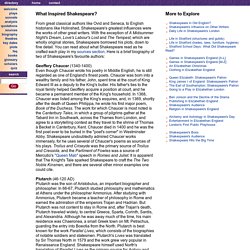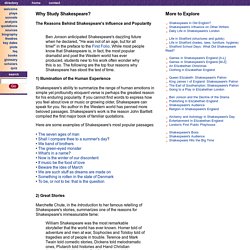

TEDxAldeburgh - Akala - Hip-Hop & Shakespeare? Shakespeare is everywhere: Christopher Gaze at TEDxVancouver. "Why Shakespeare? Because it's 2016" Love or Lust? Romeo and Juliet Part II: Crash Course English Literature #3.
Of Pentameter & Bear Baiting - Romeo & Juliet Part I: Crash Course English Literature #2. Why Shakespeare loved iambic pentameter - David T. Freeman and Gregory Taylor. Insults by Shakespeare - April Gudenrath. What Inspired Shakespeare? What Inspired Shakespeare?

From great classical authors like Ovid and Seneca, to English historians like Holinshed, Shakespeare's greatest influences were the works of other great writers. With the exception of A Midsummer Night's Dream, Love's Labour's Lost and The Tempest, which are wholly original stories, Shakespeare borrowed his plots, down to fine detail. You can read about what Shakespeare read as he crafted each play in my sources section. Here is a brief biography of two of Shakespeare's favourite authors: Geoffery Chaucer (1340-1400) Even though Chaucer wrote his poetry in Middle English, he is still regarded as one of England's finest poets. Plutarch (46-120 AD) Plutarch was the son of Aristobulus, an important biographer and philosopher.
For more on Shakespeare's debt to Plutarch please see the following articles: What Are the Main Sources Used in Shakespeare's Plays? BBC iWonder - Why was Shakespeare so special? Why is Shakespeare Important? Why Study Shakespeare?

The Reasons Behind Shakespeare's Influence and Popularity Ben Jonson anticipated Shakespeare's dazzling future when he declared, "He was not of an age, but for all time! " in the preface to the First Folio. While most people know that Shakespeare is, in fact, the most popular dramatist and poet the Western world has ever produced, students new to his work often wonder why this is so.
The following are the top four reasons why Shakespeare has stood the test of time. 1) Illumination of the Human Experience Shakespeare's ability to summarize the range of human emotions in simple yet profoundly eloquent verse is perhaps the greatest reason for his enduring popularity. Here are some examples of Shakespeare's most popular passages: • The seven ages of man • Shall I compare thee to a summer's day?
2) Great Stories. Did Shakespeare really write his own plays? - Ask History. Most scholars accept that William Shakespeare was born in Stratford-upon-Avon, and spent time acting in London before returning to Stratford, where he lived until his death in 1616.

But actual documentation of his life is pitifully scarce: little more than several signatures, records of his marriage to Anne Hathaway and the birth of their children, a three-page will and some business papers unrelated to writing. Above all, nothing has been found documenting the composition of the 37 plays and 154 sonnets attributed to him, collectively considered the greatest body of work in the history of the English language. In the absence of such “proof” of authorship, some skeptics have posed the question: How could a man of such humble origins and education come by such wealth of insight, wide-ranging understanding of complex legal and political matters and intimate knowledge of life in the English court? Shakespeare a-t-il écrit ses pièces ? - Natalya St. Clair et Aaron Williams.
Did Shakespeare Really Write His Plays? A Few Theories Examined. Edward de Vere, 17th Earl of Oxford Edward de Vere, 17th Earl of Oxford (1550 -1604) was a relatively late entrant into the Shakespeare authorship wars, but for the past nine decades, Oxfordians, as they’ve come to be known, have presented the dominant challenge to Stratfordians, that is, to those who believe William Shakespeare wrote his own plays.

The candidacy of the Earl of Oxford was first proposed in 1920 by the unfortunately named J.T. Looney (though it’s pronounced “loney”) in his book Shakespeare Identified. Since then, the case for de Vere’s authorship has been bolstered by famous supporters such as Sigmund Freud, as well as by the formation of Oxford societies on both sides of the Atlantic, including one formed by a descendent of de Vere himself. Now, with the movie Anonymous, the argument for the Earl of Oxford is getting the big screen treatment. Actually, it’s not the first time the theory has been mentioned on the big screen.